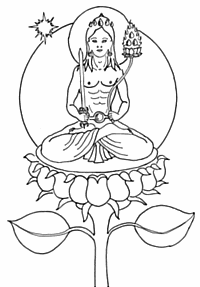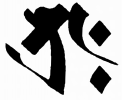

ā kā śa ga rbha
Ākāśagarbha (Japanese: 虚 空 蔵 = kokūzō) is an important figure in far eastern Buddhism. His emblems are the sword and cintamani (or wish fulling jewel). He is sometimes shown as here, and sometimes with his right hand in the varada, or giving, mudra. He is one of the eight Great Bodhisattvas.
Ākāśagarbha is very important in the life story of Kūkai. As a teenager he met a Buddhist priest who taught him a mantra of Ākāśagarbha known in Japanese as Gumonji-hō, also known as the Morning Star Mantra (see below). It was in repeating this mantra millions of times that he had some decisive spiritual experiences, including many powerful visions of Ākāśagarbha.
Seed Syllable

The seed syllable of Ākāśagarbha is trāḥ, which is also associated with Ratnasambhava in some mandalas.
Mantra

Transliteration
oṃ va jra ra tna oṃ trāḥ svā hā
oṃ vajra ratna oṃ trāḥ svāhā
The Japanese pronunciation of this mantra is:
om bazara aratanno om taraku sowaka
Morning Star Mantra
This mantra is very important in Shingon Buddhism and comes from a text known in Japanese as Kokūzō bosatsu nō man shogan saishō shin darani gumonji hō (虛空藏菩薩能滿諸願最勝心陀羅尼求聞持法 : T 20 #1145). Repeated one million times according to the requisite rituals, in a certain time period, one gains the ability to remember and understand any text.

Transliteration
na mo ā kā śa ga rbha ya oṃ ā rya ka ma ri mau li svā hā
namo ākāśagarbhaya oṃ ārya kamari mauli svāhā
The Japanese pronunciation of this mantra is:
nōbō akyasha kyarabaya on ari kyamari bori sowaka
